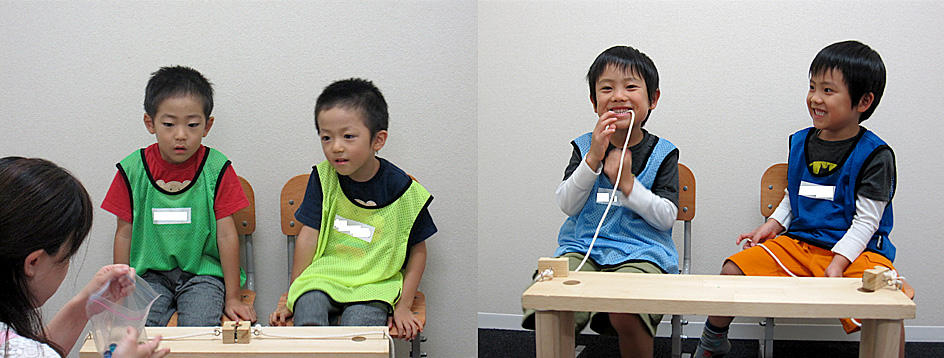A combination of genetic and environmental influences play a role in preparing children for school

Studies are being conducted for both dizygotic (fraternal) twins (left) and monozygotic (identical) twins (right). © Keio University
Preschool years (ages 3-4) are of prime importance in ensuring children are well-prepared for school. Children's successful adaptation at school requires a balance of properly developed social and pre-academic skills. Two important brain functions driving these skills are executive function (EF) that controls our ability to plan, set, and execute tasks, and general cognitive ability (GCA) that includes IQ. But how exactly EF and GCA influence a child's preschool development is unknown. Keiko K. Fujisawa and colleagues at Keio University have recently published a study that aimed to address this question by studying Japanese preschool twins.
The team wanted to understand precisely how EF, GCA, and pre-academic skills work together to enhance a child's development during preschool. Although many such studies have been conducted in English-speaking countries, relatively few have taken place in countries with different cultures, educational systems, and nursing behaviors. Furthermore, few studies have taken the factors of genetics and environment into consideration. For this study, pairs of identical and fraternal twins were first studied at the age of 3.5 years and then again after they had turned 5 years old. At both ages, the children undertook simple tasks to assess their EF and GCA, as well as math and reading (pre-academic) abilities.
To understand the interplay between genetic and environmental influences on these functions, the researchers compared the task performances of identical twins with fraternal twins. While only the identical twins had the same genetic make-up, all sets of twins had a shared environment. After carefully examining more than 250 sets of twins, results showed that genetic factors and shared environments were equally responsible for the maturity of EF, GCA, and preacademic abilities. However, the impact of genes and environment on EF and GCA was different for the two age brackets.
A gene that strongly influenced GCA at 3.5 years of age was responsible for preacademic ability by 5 years. However, in addition to GCA, preacademic ability at 5 years old was also influenced by environmental factors, which affected both EF and preacademic ability at age 3.5. Furthermore, the team found that the shared environment replaced genetic factors as the main influence on GCA once the children reached 5 years of age. The environment was therefore the most important factor at 3.5 years, influencing GCA and preacademic abilities during preschool years. Nonetheless, genetic factors appear to strongly affect EF and math ability at the age of 5 years, independent of GCA.
"These results have implications for effective interventions designed to foster children's school readiness," the researchers conclude. The systems in place for preparing kids for school are complicated ― no single factor is responsible and the burden is shared equally by a child's environment and genetic make-up. These two factors need to be considered early on to optimize children's preschool development.
Published online 25 April 2019
About the researcher
Keiko K. Fujisawa― Associate Professor
Department of Education Studies, Faculty of LettersKeiko K. Fujisawa received her doctorate from the University of Tokyo in 2007 and joined Keio University as an assistant professor in the same year. She is studying optimal home/out-home environments for children based on their unique background and developmental trajectories. She is conducting psychological and behavioral genetic research on social and cognitive development as well as mental health in children during infancy and early adolescence.
Links
Reference
- Fujisawa K. K., Todo N. and Ando J. Changes in Genetic and Environmental Influences on Cognitive Ability, Executive Function, and Preacademic Skills in Japanese Preschool Age Twins. Developmental Psychology 55, 38-52 (2019). | article